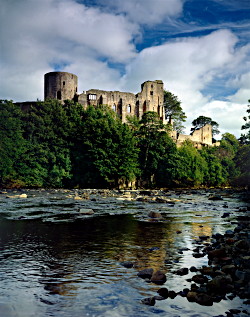| |
Introduction and Map/
Family Background/
My father: the able man / My father: the lay preacher / School days / Dangerous Occupations/ Going to Sea I / Going to Sea II /
Going to Sea III / Passage to America/ First Steps / The Great Lakes /
Return to England / A Narrow Escape /
Passage to New Zealand / Auckland / Finding a Mission / Fit for Mission Work?/ A Suitable Helpmeet / A Bush Honeymoon / Our Worst Night /
Missionary Heroes / Sydney to Samoa
Acknowledgments& Links
 |
The little quiet town of Barnard Castle, in the county of Durham, in which I was born, had been the scene of many stirring events in border history. Many a fierce fight was fought under the walls of the old castle, which still rears its ruined walls far above the rushing Tees at the foot of the cliff on which the castle was built.
As it is the usual thing to say something of a man's ancestry in writing his life, I may state that the oldest member of our family on my father’s side that I ever knew was his grandmother, an old lady at Staindrop, a few miles from Barnard Castle. She always declared that she could trace her ancestry in a direct line to Bishop Ridley ; and I may say, in passing, that when I was home in 1886 and visited Staindrop, I inquired of the old parish clerk, and he assured me that the lady was quite correct in her statement. My own grandfathers and grandmothers I never knew.
My father, George Brown, was left an
orphan at thirteen, and had ever afterwards to depend entirely on his
own exertions. He came to Barnard Castle as an office-boy for a
solicitor, and step by step won for himself a very important position
in the town and county in which his life was passed. I may be pardoned,
perhaps, for giving here a quotation from a memoir published by the
Rev. Brooke Herford. He says : The name of George Brown was
not only familiar through all that country side, but was known and
regarded with a rare respect throughout Durham and the whole North
Riding, and tenderly beloved by many a little flock of Christian people
in those parts. Though he was a Dissenter, and not only a Unitarian but
a Unitarian who preached in the little chapel Sunday by Sunday, his
townsmen felt that in him they had lost their ablest man ; his funeral
became spontaneously a public one, and the parish church bells rang
muffled peals during the service.